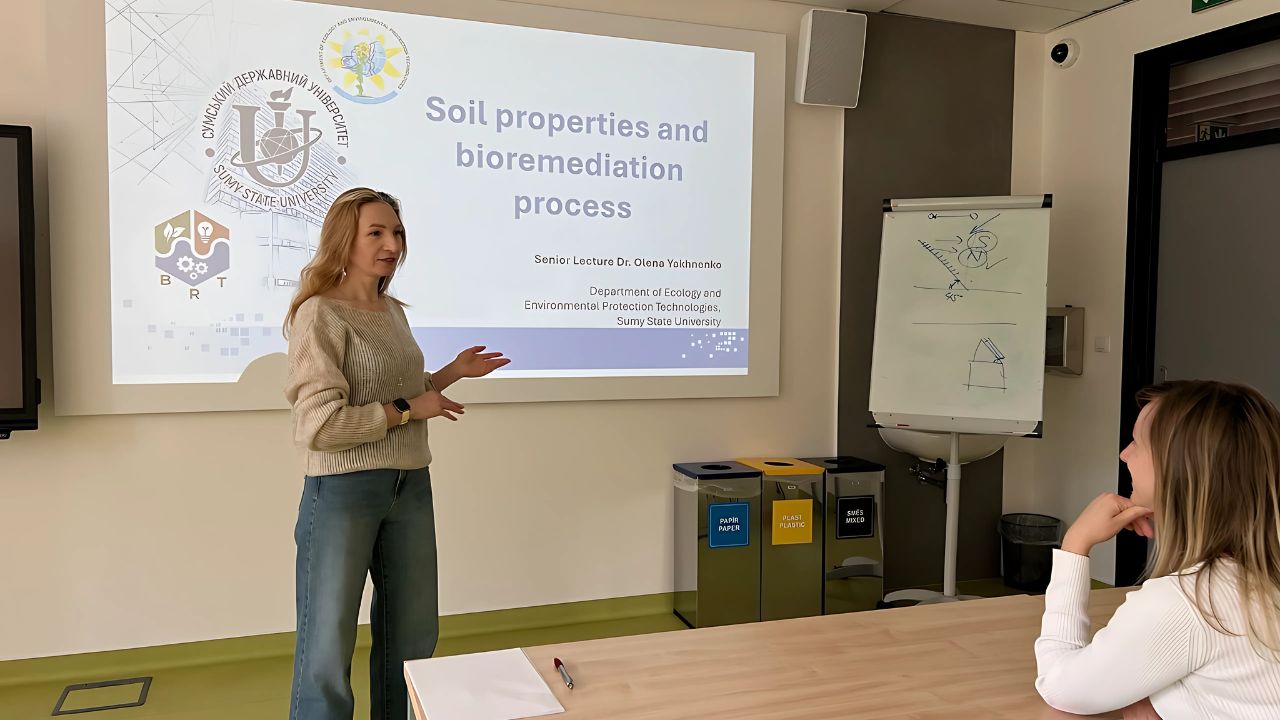From Lab to Lecture: Strengthening Scientific Ties with Ukraine through Erasmus+
The Czech University of Life Sciences Prague (CZU) continues it’s fruitful cooperation with Ukrainian universities through the Erasmus+ Programme, welcoming scholars from across Ukraine for practical and scientific training.
As part of the Erasmus+ Mobility Agreement for Staff Training, the BioResources and Technology Division (BRT) welcomed Olena Yakhnenko, a lecturer from Sumy State University. She participated in a scientific training programme hosted by the Faculty of Tropical AgriSciences (FTZ) and BRT at CZU. Read about her experience below!
The training began with an introductory tour of the CZU campus, highlighting eco-friendly technologies implemented across the university. Special attention was given to smart buildings and their energy efficiency, green roofs, waste management systems, and the use of organic waste through composting and anaerobic digestion for circular applications. Additionally we had a greenhouse tour where students and lecturers of the Department of Ecology and Environmental Technologies at Sumy State University (who were also participating in Erasmus+ mobility) joined. This visit offered an excellent opportunity to explore plant biodiversity and ecological adaptation strategies across various climate zones through live specimens.
Hands-On Research at the BRT Laboratory
The second phase of the training focused on applied research at the BRT Research Laboratory, where Dr. Yakhnenko worked alongside BRT members and international students. The soil bioremediation studies using secondary-cycle products investigated the potential of leachate and phosphogypsum to support soil bioremediation, aiming to restore microbial diversity and stimulate vegetation development in degraded soils. During the chemical analysis of substrates, the chemical composition of the liquid substrate phases was analyzed using a spectrophotometer, which significantly improves both speed and accuracy in laboratory work. Research activities also focused on biogas production, analysing the biological and chemical variables that impact gas quality and yield.
“I truly value the opportunity to collaborate on scientific research with students and PhD candidates from different parts of the world. This experience not only enhances technical skills but also promotes knowledge exchange, teamwork, and language development,” – Dr. Yakhnenko
Academic Involvement
Beyond laboratory work, Dr. Yakhnenko also took part in academic lectures at CZU, broadening her teaching and learning experience in an international educational environment. The lectures included scientific dialogue on restoring war-degraded soils in Ukraine using organic decomposition products derived from composting and anaerobic digestion. Increasing the organic matter in the soil is considered a key method to stimulate regeneration and resilience.
Participation in the BIO-CAPITAL meeting on Bioeconomy and Biodiversity
An additional highlight of the mobility programme was attending the three-day BIO-CAPITAL Project meeting at CZU, led by Assoc. Prof. Dr. Hynek Roubík. The event brought together researchers and experts from across Europe to address biodiversity conservation, sustainability, and innovative bio-based solutions under the Horizon Europe 2025 framework. During the forum, participants discussed topics such as biodiversity restoration, the sustainable use of biomass, and the potential of biotechnological innovations in green transitions.
Looking Ahead: Future Scientific Cooperation
“I am sincerely grateful to the organizers at CZU – especially Assoc. Prof. Hynek Roubík – and my colleagues from Sumy State University for this unforgettable opportunity to spend 1.5 weeks engaged in valuable scientific training under the Erasmus+ Programme. It was a chance to gain hands-on experience and establish new international academic connections.” – Dr. Yakhnenko
Based on the successful collaboration and research directions observed at the BRT Laboratory, future scientific stays are already being considered!
Plans include:
- Conducting in vitro plant cultivation experiments on various nutrient substrates
- Studying the impact of second-cycle materials (phosphogypsum, digestate, etc. on plant productivity and soil recovery
-
Investigating the microbiological dynamics of biogas production processes
For more details on BRT activities, subscribe to our newsletter or follow us on social media for regular updates and highlights.


